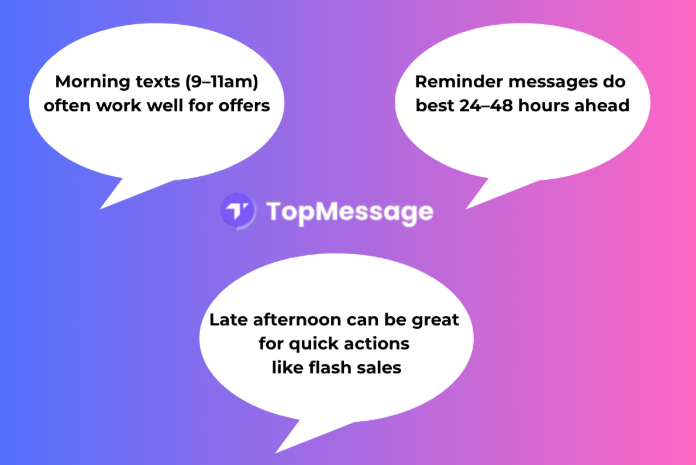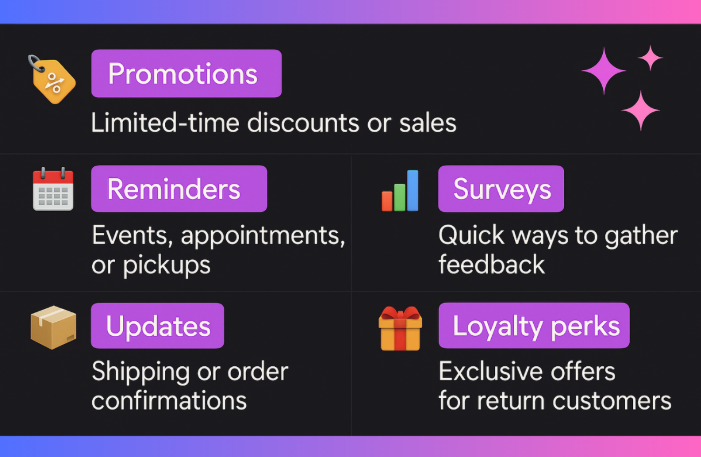
These days, people are glued to their phones. So it’s no surprise that text messaging is one of the best ways to reach them. But while it’s easy to send a text, turning that message into real results takes more than just hitting "send."
If you're wondering how to make SMS marketing campaigns work for your business, you're in the right place. This guide breaks it down into simple steps, with helpful tips and real examples to get you started, regardless of if you're new to SMS or just want better results.
Why SMS Still Works (And Works Really Well)
Before diving into the “how,” let’s look at what an SMS marketing campaign is and why it’s worth your time.
In simple terms, it’s a way for businesses to send promotional or useful messages directly to their audience’s phones. This could include special offers, updates, reminders, or anything else that brings value.
Key Benefits of SMS Marketing Campaigns
Now that we have an answer to “What is an SMS marketing campaign?”, it’s time to discuss its benefits.
There are a lot of advantages of SMS marketing campaigns, but here are a few that stand out:
- Super high open rates – Most people read texts within minutes.
- Personal feel – Texts come across as more direct and one-on-one.
- No need for internet – Great for reaching people anytime, anywhere.
- Fast and to the point – There’s no room for fluff, just the essentials.
It’s one of the easiest ways to stay top of mind…if you use it right.
Step-by-Step: How to Make an SMS Marketing Campaign Work
Now let’s break down the actual process. Here’s what you’ll want to do from start to finish.
1. Start with a Clear Goal
Think about what you want your message to do. Are you:
- Promoting a sale?
- Sharing an event reminder?
- Asking for feedback?
Learning how to make an SMS marketing campaign starts with having a clear goal that keeps your message focused. It also helps you know what to measure afterward.
2. Build a Smart Contact List
You can’t run a campaign without people to message. Start by collecting numbers through website forms, checkout pages, or even in-store signups. But don’t stop there - segment your list based on things like:
- Shopping behavior
- Location
- How recently did someone make a purchase
The more relevant the message, the better the results.
3. Write Messages People Actually Want
Keep it short. Keep it useful. And make sure there’s a reason for someone to care.
Here’s a simple format that works:
[Brand name]: [Offer or info] – [Why it matters] – [Action to take]
For example: “Glow Skincare: 20% off serums until Sunday! Your glow-up starts here: [link]”
Short, clear, and helpful. That’s the goal.
Timing and Testing Make a Big Difference
Sending messages at the right time can double your results. And small tests can lead to big wins.
When to Send

Just don’t send texts too early or too late. After all, it’s important to always respect your audience’s time zone.
Why Testing Helps
Try sending the same message in two different styles to see which one performs better. Change one thing at a time, like the offer, the tone, or even the emoji. Keep what works and skip what doesn’t.
This is one of the most effective ways to turn a decent marketing campaign into a great one.
Examples of SMS Marketing That Delivered Results
Looking for inspiration? These brands have effectively used SMS marketing to engage customers and boost sales. Here's how they did it:
Subway: Boosting Lunchtime Sales with Timely Deals
Campaign: Subway sent SMS promotions during lunch hours, offering exclusive deals to nearby customers.
Result: This timely approach increased in-store traffic and orders during typically slower periods.
Why it worked: By reaching customers when they were deciding on lunch options, Subway provided immediate value, prompting quick action.
Pizza Hut UK: Leveraging Geofencing for Local Promotions
Campaign: Pizza Hut implemented a geofencing strategy, sending SMS offers to customers within a half-mile radius of their locations.
Result: Over a 15-month period, the campaign proved to be 4.4 times more effective than TV ads and 2.6 times more effective than online ads, significantly boosting incremental sales.
Why it worked: By targeting customers based on their real-time location, Pizza Hut delivered relevant offers precisely when customers were nearby and likely to make a purchase.
Nike: Creating Urgency with Exclusive Product Launches
Campaign: Nike sent SMS messages to loyal customers, offering early access to limited-edition product releases.
Result: The exclusivity and time-sensitive nature of the messages led to products selling out within hours, enhancing customer engagement and brand loyalty.
Why it worked: By providing exclusive opportunities through SMS, Nike tapped into customers' desire for unique products and experiences, prompting immediate action.
Know Your Campaign Types
There are different types of SMS marketing campaigns you can try, depending on your goal:
- Promotions Limited-time discounts or sales
- Reminders Events, appointments, or pickups
- Surveys Quick ways to gather feedback
- Updates Shipping or order confirmations
- Loyalty perks Exclusive offers for return customers

Each one has a place. It’s just a matter of choosing what fits your brand and audience.
Bonus Tip: Send a Follow-Up Message
Here’s one of the best tips for a successful SMS marketing campaign that many don’t know about: if someone didn’t click or act on the first message, try again. But change it up slightly.
This “second chance” text, sent maybe a day or two later, can grab attention without being annoying. Add a stronger offer, different wording, or a clearer call to action.
Done right, it feels thoughtful, not pushy.
FAQs
How long should an SMS marketing message be?
Stick to around 160 characters or fewer. Clear and concise always wins.
Is SMS marketing expensive?
Not really. Costs are generally low per message, and the return on investment can be huge if done right.
Can I use SMS for customer service updates?
Yes! Order confirmations, delivery updates, and appointment reminders are perfect uses.
Do I need permission to text people?
Yes. Always get a clear opt-in before sending marketing texts to avoid legal trouble and build trust.
How does SMS fit into a larger marketing campaign?
It works great as a support channel—boosting visibility, urgency, and response rates when used alongside email or social media.